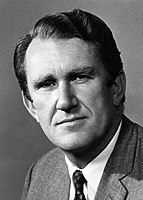
Back Elecciones federales de Australia de 1975 Spanish Élections fédérales australiennes de 1975 French
| |||||||||||||||||||||||||||||||||||||||||||
All 127 seats of the House of Representatives 64 seats were needed for a majority in the House All 64 seats of the Senate | |||||||||||||||||||||||||||||||||||||||||||
|---|---|---|---|---|---|---|---|---|---|---|---|---|---|---|---|---|---|---|---|---|---|---|---|---|---|---|---|---|---|---|---|---|---|---|---|---|---|---|---|---|---|---|---|
| Registered | 8,262,413 | ||||||||||||||||||||||||||||||||||||||||||
| Turnout | 7,881,873 (95.39%) ( | ||||||||||||||||||||||||||||||||||||||||||
| |||||||||||||||||||||||||||||||||||||||||||
 Results by division for the House of Representatives, shaded by winning party's margin of victory. | |||||||||||||||||||||||||||||||||||||||||||
| |||||||||||||||||||||||||||||||||||||||||||
The 1975 Australian federal election was held in Australia on 13 December 1975. All 127 seats in the House of Representatives and all 64 seats in the Senate were up for election, due to a double dissolution.
Malcolm Fraser had been commissioned as caretaker prime minister following the dismissal of Gough Whitlam's three-year-old Labor government by Governor-General Sir John Kerr, on 11 November 1975. The same day, Fraser advised an immediate double dissolution, in accordance with Kerr's stipulated conditions (see 1975 Australian constitutional crisis).
The Coalition of Fraser's Liberal Party of Australia and Doug Anthony's National Country Party secured government in its own right, winning the largest majority government to date in Australian history.[a] The Liberals actually won a majority in their own right, with 68 seats–the first time that the main non-Labor party had done so since adopting the Liberal banner in 1944. Although Fraser had no need for the support of the National Country Party, the Coalition was retained. It was also the first time a party won over 90 seats at an Australian election. This was the last federal election the Coalition won more than 50% of the primary vote.
Labor suffered a 30-seat swing and saw its lower house caucus cut almost in half, to 36 seats—fewer than it had when Whitlam became leader in the aftermath of the Coalition landslide nearly 10 years earlier, in the 1966 election. With only 28% of the House of Representatives seats, this is the worst seat share for Labor since the current Liberal-Labor party contest from 1946.
Cite error: There are <ref group=lower-alpha> tags or {{efn}} templates on this page, but the references will not show without a {{reflist|group=lower-alpha}} template or {{notelist}} template (see the help page).

